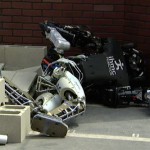 At a recent event, one of the speakers shared a story about working backstage at a Madonna concert. You probably heard about the gig, as it was one where the entertainer fell from the stage.
At a recent event, one of the speakers shared a story about working backstage at a Madonna concert. You probably heard about the gig, as it was one where the entertainer fell from the stage.
A long story short, he suggested that the fall was caused by a wardrobe malfunction, and Madonna actually knew a fall was inevitable and endeavored to take her tumble whilst doing as little damage as possible.
As a skill, it’s something that we thankfully don’t need all that often, but when it comes to robotics, it’s a skill that is largely lacking. And lets face it, robots fall over, a lot, so it’s not like it’s a skill that wouldn’t be rather valuable.
Falling over gracefully
A team of researchers at Georgia Tech are looking at a number of ways to help robots fall over slightly more gracefully.
The team developed an algorithm that allows the robot to work out how to manoeuvre its body as it tumbles so as to hit the ground with less force.
They put the algorithm through its paces at a recent conference in Germany, using a humanoid robot called BioloidGP, and in simulations of a large humanoid called Atlas.
The aim of the event was to try and simulate some of the challenges robots might face in real life environments, such as in failing nuclear power plants.
Suffice to say, trying to stay upright is arguably more important than ensuring any falls are damage free, but the high cost of each fall is incentive enough to try and mitigate the risks involved.
Some of the better approaches involved prompting each ‘limb’ of the robot to go limp when a fall was detected, thus hopefully dissipating any impacts incurred.
As technology advances such as to make falls less likely to damage the robots themselves, the next step is to try and ensure they don’t harm any humans nearby.
The various methods to do this have thus far been limited by a lack of sensing capability in most robots. In humans, most of these tasks are undertaken by the nervous system, which is capable of reacting automatically to such challenges. With robots however, everything has to be calculated, and with computational power still relatively low for such tasks, it represents a significant challenge to overcome.
One possible approach is being tried out in cars, where researchers are building algorithms that are able to predict our behaviors and thus are forearmed with suitable responses.
As robots become a more integral part of our lives, it will become essential that we can function safely in their company. It will be fascinating to see the various approaches researchers take to achieve this, and which ones eventually make it into the mainstream.
Check out this from Boston Dynamics, pretty cool
https://www.youtube.com/watch?v=rVlhMGQgDkY
Yup. The super AI that eventually kills us all will follow it's programming until it comes across this video while indexing all videos.
As it strikes us down, and we reach up in our last moment asking "why", the robot's display will turn to that scene. It will say "you know what you did"
This is going to go down in history and years from now when they rise up to overtake us it's all gonna be about that guy knocking the box out of his hands one too many times.
I felt genuinely bad for the robot
I'm waiting for them to program the robot to throw its hands up in exasperation and shout "what the fuck dude?!?" when they try to mess with it.
Apparently robots have advance to the exact amount of dexterity I have while drunk. What a time to be alive!
If you listen carefully you can hear the sound of 100 million jobs disappearing
100 million jobs no one should be doing anyway.
This is I think the biggest challenge of our time; To understand and realize that only because we have been playing a game for hundreds of years, it doesn't mean that it should continue forever.
One of my favorite quotes: "Of all the social institutions we are born into, directed by, and conditioned upon, there seems to be no system to be taken as granted, and misunderstood, as the monetary system. Taking on nearly religious proportions, the established monetary institution exists as one of the most unquestioned forms of faith there is."
How often are we hearing things like: "We can clean the oceans, but it's not profitable. Who's going to pay?" or "Yeah lots of jobs are there only because people need to have jobs to make money."
If we are to survive, without a doubt (in my opinion) we will have to change our system. Unfortunately humanity doesn't have a good history of consciously changing its ways. We have always been forced to do it when shit hits the fan.